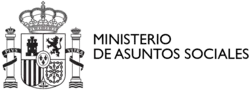Ministry of Social Affairs (Spain)
The Ministry of Social Affairs (MAS), since 2020 known as Ministry of Social Rights and 2030 Agenda, is a department of the Government of Spain responsible for the government policies on social services, family, minors protection, disability and prevention of youth crime, adoptions and foster care and the promotion of cultural communication and youth association. Likewise, the department is responsible for the government policies on animal welfare and UN Sustainable Development Goals.[2]
| Ministerio de Derechos Sociales y Agenda 2030 | |
 | |
_14.jpg.webp) Headquarters of the Ministry | |
| Agency overview | |
|---|---|
| Formed | 12 July 1988 (as "Ministry of Social Affairs") 13 January 2020 (as "Ministry of Social Rights and 2030 Agenda") |
| Preceding agencies |
|
| Dissolved | 6 May 1996 |
| Superseding agency |
|
| Type | Ministry |
| Jurisdiction | Government of Spain |
| Annual budget | € 3.9 billion, 2021[1] |
| Minister responsible | |

The current minister is Pablo Iglesias Turrión, who is also Second Deputy Prime Minister.
History
The department was created in 1988 during the premiership of Felipe González and assumed powers from the Ministry of Labour and Social Security, the National Institute for Social Services, the Ministry of Culture and the Ministry of Justice.[3] In 1996, the new prime minister José María Aznar abolished the department and transferred its competences to the Ministry of Labour and Social Affairs.[4]
During its first period of live, the department assumed powers relating social services, equality, minors protection and prevention of youth crime, adoptions and foster care and the promotion of cultural communication and youth association. Likewise, the department was responsible for the management of the social programs derived from funds obtained through the personal income tax and in its later years from the government migration policy.[3][4]
The department was re-established in January 2020 by prime minister Pedro Sánchez.
Organization chart
Current structure
The current structure is:[5]
- The Secretariat of State for Social Rights.
- The Directorate-General for Children and Adolescents Rights.
- The Directorate-General for Family Diversity and Social Services.
- The Directorate-General for Disability Support Policies.
- The Secretariat of State for 2030 Agenda.
- The Directorate-General for Lever Policies for Compliance with the 2030 Agenda.
- The Undersecretariat of Social Rights and 2030 Agenda.
- The Technical General Secretariat.
- The Directorate-General for Animal Rights.
Ministry agencies
- Royal Board on Disability
- Institute for the Elderly and Social Services
- Institute of Youth
- Spanish Agency for Food Security and Nutrition
1988 structure
The original structure, created in 1988, was:[6]
- Undersecretariat of Social Affairs.
- Technical Directorate-General and for Services.
- Directorate-General for Social Action.
- Directorate-General for Legal Protection of Minors.
In addition, the government agencies Institute of Women, Institute of Youth and the National Institute for Social Services were attached to the department.
In 1993, the ministry assumed powers over emigrants and immigrants through the Directorate-General for Migrations[7] and, in 1994, the Directorate-General for Legal Protection of Minors was renamed Directorate-General for Minors and Family.[8]
List of officeholders
Office name:
- Ministry of Social Affairs (23 July 1988–6 May 1996)
- Ministry of Social Rights and 2030 Agenda (13 January 2020–present)
| Portrait | Name (Birth–Death) |
Term of office | Party | Government | Prime Minister (Tenure) |
Ref. | ||||
|---|---|---|---|---|---|---|---|---|---|---|
| Took office | Left office | Duration | ||||||||
.jpg.webp) |
Matilde Fernández (born 1950) |
23 July 1988 |
7 December 1989 |
4 years and 356 days | PSOE | González II | Felipe González.jpg.webp) (1982–1996) |
[9] [10] | ||
| 7 December 1989 |
14 July 1993 |
González III | ||||||||
.jpg.webp) |
Cristina Alberdi (born 1946) |
14 July 1993 |
6 May 1996 |
2 years and 297 days | PSOE | González IV | [11] | |||
| Office disestablished during this interval. | ||||||||||
.jpg.webp) |
Pablo Iglesias (born 1978) |
13 January 2020 |
Incumbent | 1 year and 4 days | Podemos | Sánchez II | Pedro Sánchez.jpg.webp) (2018–present) |
[12] | ||
References
- "2021 State Budget" (PDF). www.boe.es. 4 January 2021. Retrieved 6 January 2021.
- "Royal Decree 2/2020, of January 12, which restructures the ministerial departments". boe.es. Retrieved 2020-01-13.
- "Royal Decree 727/1988, of July 11, on the restructuring of Ministerial Departments". www.boe.es. Retrieved 2019-09-04.
- "Royal Decree 758/1996, of May 5, on the restructuring of Ministerial Departments". www.boe.es. Retrieved 2019-09-04.
- "Royal Decree 139/2020, of January 28, which establishes the basic organic structure of the ministerial departments". boe.es. Retrieved 2020-01-30.
- "Royal Decree 791/1988, of July 20, which determines the initial organizational structure of the Ministry of Social Affairs". boe.es. Retrieved 2019-09-04.
- "BOE.es - Documento BOE-A-1993-28967". boe.es. Retrieved 2019-09-04.
- "BOE.es - Documento BOE-A-1994-26930". boe.es. Retrieved 2019-09-04.
- "Real Decreto 731/1988, de 11 de julio, por el que se nombran Ministros del Gobierno" (pdf). Boletín Oficial del Estado (in Spanish). Agencia Estatal Boletín Oficial del Estado (166): 21538. 12 July 1988. ISSN 0212-033X.
- "Real Decreto 1455/1989, de 6 de diciembre, por el que se nombran Ministros del Gobierno" (pdf). Boletín Oficial del Estado (in Spanish). Agencia Estatal Boletín Oficial del Estado (293): 38143. 7 December 1989. ISSN 0212-033X.
- "Real Decreto 1175/1993, de 13 de julio, por el que se nombran Ministros del Gobierno" (pdf). Boletín Oficial del Estado (in Spanish). Agencia Estatal Boletín Oficial del Estado (167): 21211. 14 July 1993. ISSN 0212-033X.
- "Real Decreto 8/2020, de 12 de enero, por el que se nombran Ministros del Gobierno" (pdf). Boletín Oficial del Estado (in Spanish). Agencia Estatal Boletín Oficial del Estado (11): 2882. 13 January 2020. ISSN 0212-033X.